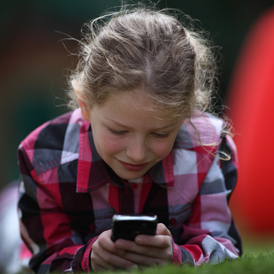UK’s teenagers ‘addicted’ to BlackBerry, iPhone and Android
Britain’s young teenagers admit they are “addicted” to their smartphones, but is it because they understand how to use them better than their parents? Channel 4 News finds out.

Research for Ofcom has revealed nearly half of Britain’s young teenagers, aged 12 to 15, own an iPhone, BlackBerry or Android mobile. Of these, 60 per cent class themselves as “highly addicted”. Their top three activities are social networking, listening to music and playing games.
By comparison, 27 per cent of the UK’s adults own a smartphone with emailing, surfing the web and social networking ranking highly among the 37 per cent who describe themselves as “addicted”.
Clare Hopping, group editor of Know Your Mobile, told Channel 4 News the youth market follows trends much more closely than adults.
She explained: “There’s also the ‘want’ culture, that means those of school age always want the same, or something better than their peers.”
She added that teenagers get to know their phones much better than their parents, making more use of the features.
“Younger generations are more likely to use the internet and keep up with the latest trends and as they have grown up with technology evolving at a fast pace, they are more likely to understand what things can do.
More from Channel 4 News: Mobile broadband on the rise as O2 wins speed test
“Older generations are more likely to see the mobile phone as a way of staying in contact, not as a device for downloading apps, playing games, listening to music or browsing the internet.
“Mobile phones have become a commodity, probably even more so than a TV or computer. They’re the one thing a teenager will always have on them to keep in contact with friends.”
With the rise of the smartphone, could we see the demise of the personal computer? Clare Hopping believes that is certainly possible as teenagers increasingly opt for mobile internet devices.
She said: “When you can get games such as Angry Birds that has almost become a cult, and Order and Chaos online, which is comparable to a game like World of Warcraft, it’s not surprising.”
BlackBerry picking
Fifty-nine per cent of those polled for Ofcom acquired their device in the last 12 months. The iPhone, made by Apple, is the most popular brand overall but BlackBerry mobiles are the preferred choice among young people. Its addictive qualities famously led to the nickname “CrackBerry”.
“BlackBerrys are available at a range of pricepoints, from pre-pay to contract so they are a natural choice [for teenagers],” says Hopping.
“One of the most common uses for the BlackBerry phone is BlackBerry Messenger and it seems this is the reason many youngsters are turning to BlackBerry.
“The application is free to use and works almost anywhere, unlike texting, which isn’t as instant and costs an allowance. This makes it a natural choice for younger generations who are likely to use IM at home.
“BlackBerrys are also available in a range of colours!”
The survey revealed that smartphone owners of all ages are more likely to have their phones switched on 24 hours a day.
It also found evidence of a blurring divide between work and holidays with 30 per cent of those polled regularly taking personal calls during working hours. Leisure time was also affected, with 24 per cent answering work-related phone calls on holiday, and 29 per cent checking work emails during a break.
Ofcom’s findings come from face-to-face interviews with 2,073 adults and an online survey of 521 12 to 15-year-olds conducted in March.